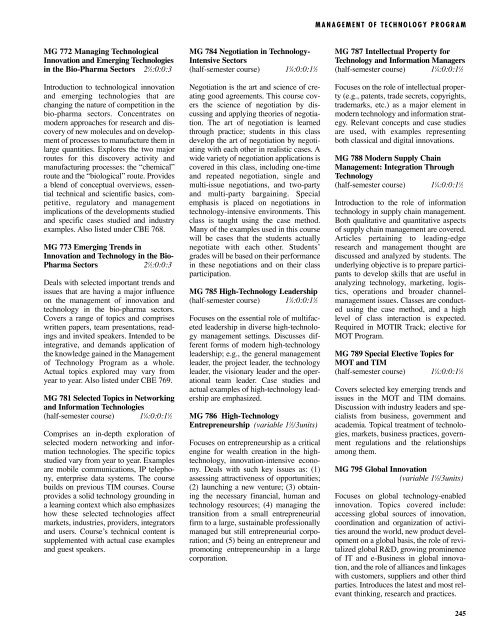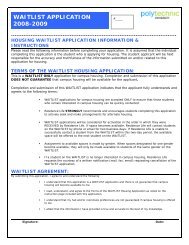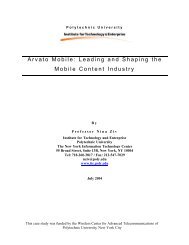POLYTECHNIC UNIVERSITY 2005-2007
POLYTECHNIC UNIVERSITY 2005-2007
POLYTECHNIC UNIVERSITY 2005-2007
You also want an ePaper? Increase the reach of your titles
YUMPU automatically turns print PDFs into web optimized ePapers that Google loves.
MANAGEMENT OF TECHNOLOGY PROGRAM<br />
MG 772 Managing Technological<br />
Innovation and Emerging Technologies<br />
in the Bio-Pharma Sectors 2 1 ⁄2:0:0:3<br />
Introduction to technological innovation<br />
and emerging technologies that are<br />
changing the nature of competition in the<br />
bio-pharma sectors. Concentrates on<br />
modern approaches for research and discovery<br />
of new molecules and on development<br />
of processes to manufacture them in<br />
large quantities. Explores the two major<br />
routes for this discovery activity and<br />
manufacturing processes: the “chemical”<br />
route and the “biological” route. Provides<br />
a blend of conceptual overviews, essential<br />
technical and scientific basics, competitive,<br />
regulatory and management<br />
implications of the developments studied<br />
and specific cases studied and industry<br />
examples. Also listed under CBE 768.<br />
MG 773 Emerging Trends in<br />
Innovation and Technology in the Bio-<br />
Pharma Sectors 2 1 ⁄2:0:0:3<br />
Deals with selected important trends and<br />
issues that are having a major influence<br />
on the management of innovation and<br />
technology in the bio-pharma sectors.<br />
Covers a range of topics and comprises<br />
written papers, team presentations, readings<br />
and invited speakers. Intended to be<br />
integrative, and demands application of<br />
the knowledge gained in the Management<br />
of Technology Program as a whole.<br />
Actual topics explored may vary from<br />
year to year. Also listed under CBE 769.<br />
MG 781 Selected Topics in Networking<br />
and Information Technologies<br />
(half-semester course) 1 1 ⁄4:0:0:1 1 ⁄2<br />
Comprises an in-depth exploration of<br />
selected modern networking and information<br />
technologies. The specific topics<br />
studied vary from year to year. Examples<br />
are mobile communications, IP telephony,<br />
enterprise data systems. The course<br />
builds on previous TIM courses. Course<br />
provides a solid technology grounding in<br />
a learning context which also emphasizes<br />
how these selected technologies affect<br />
markets, industries, providers, integrators<br />
and users. Course’s technical content is<br />
supplemented with actual case examples<br />
and guest speakers.<br />
MG 784 Negotiation in Technology-<br />
Intensive Sectors<br />
(half-semester course) 1 1 ⁄4:0:0:1 1 ⁄2<br />
Negotiation is the art and science of creating<br />
good agreements. This course covers<br />
the science of negotiation by discussing<br />
and applying theories of negotiation.<br />
The art of negotiation is learned<br />
through practice; students in this class<br />
develop the art of negotiation by negotiating<br />
with each other in realistic cases. A<br />
wide variety of negotiation applications is<br />
covered in this class, including one-time<br />
and repeated negotiation, single and<br />
multi-issue negotiations, and two-party<br />
and multi-party bargaining. Special<br />
emphasis is placed on negotiations in<br />
technology-intensive environments. This<br />
class is taught using the case method.<br />
Many of the examples used in this course<br />
will be cases that the students actually<br />
negotiate with each other. Students’<br />
grades will be based on their performance<br />
in these negotiations and on their class<br />
participation.<br />
MG 785 High-Technology Leadership<br />
(half-semester course) 1 1 ⁄4:0:0:1 1 ⁄2<br />
Focuses on the essential role of multifaceted<br />
leadership in diverse high-technology<br />
management settings. Discusses different<br />
forms of modern high-technology<br />
leadership; e.g., the general management<br />
leader, the project leader, the technology<br />
leader, the visionary leader and the operational<br />
team leader. Case studies and<br />
actual examples of high-technology leadership<br />
are emphasized.<br />
MG 786 High-Technology<br />
Entrepreneurship (variable 1 1 ⁄2/3units)<br />
Focuses on entrepreneurship as a critical<br />
engine for wealth creation in the hightechnology,<br />
innovation-intensive economy.<br />
Deals with such key issues as: (1)<br />
assessing attractiveness of opportunities;<br />
(2) launching a new venture; (3) obtaining<br />
the necessary financial, human and<br />
technology resources; (4) managing the<br />
transition from a small entrepreneurial<br />
firm to a large, sustainable professionally<br />
managed but still entrepreneurial corporation;<br />
and (5) being an entrepreneur and<br />
promoting entrepreneurship in a large<br />
corporation.<br />
MG 787 Intellectual Property for<br />
Technology and Information Managers<br />
(half-semester course) 1 1 ⁄4:0:0:1 1 ⁄2<br />
Focuses on the role of intellectual property<br />
(e.g., patents, trade secrets, copyrights,<br />
trademarks, etc.) as a major element in<br />
modern technology and information strategy.<br />
Relevant concepts and case studies<br />
are used, with examples representing<br />
both classical and digital innovations.<br />
MG 788 Modern Supply Chain<br />
Management: Integration Through<br />
Technology<br />
(half-semester course) 1 1 ⁄4:0:0:1 1 ⁄2<br />
Introduction to the role of information<br />
technology in supply chain management.<br />
Both qualitative and quantitative aspects<br />
of supply chain management are covered.<br />
Articles pertaining to leading-edge<br />
research and management thought are<br />
discussed and analyzed by students. The<br />
underlying objective is to prepare participants<br />
to develop skills that are useful in<br />
analyzing technology, marketing, logistics,<br />
operations and broader channelmanagement<br />
issues. Classes are conducted<br />
using the case method, and a high<br />
level of class interaction is expected.<br />
Required in MOTIR Track; elective for<br />
MOT Program.<br />
MG 789 Special Elective Topics for<br />
MOT and TIM<br />
(half-semester course) 1 1 ⁄4:0:0:1 1 ⁄2<br />
Covers selected key emerging trends and<br />
issues in the MOT and TIM domains.<br />
Discussion with industry leaders and specialists<br />
from business, government and<br />
academia. Topical treatment of technologies,<br />
markets, business practices, government<br />
regulations and the relationships<br />
among them.<br />
MG 795 Global Innovation<br />
(variable 1 1 ⁄2/3units)<br />
Focuses on global technology-enabled<br />
innovation. Topics covered include:<br />
accessing global sources of innovation,<br />
coordination and organization of activities<br />
around the world, new product development<br />
on a global basis, the role of revitalized<br />
global R&D, growing prominence<br />
of IT and e-Business in global innovation,<br />
and the role of alliances and linkages<br />
with customers, suppliers and other third<br />
parties. Introduces the latest and most relevant<br />
thinking, research and practices.<br />
245




